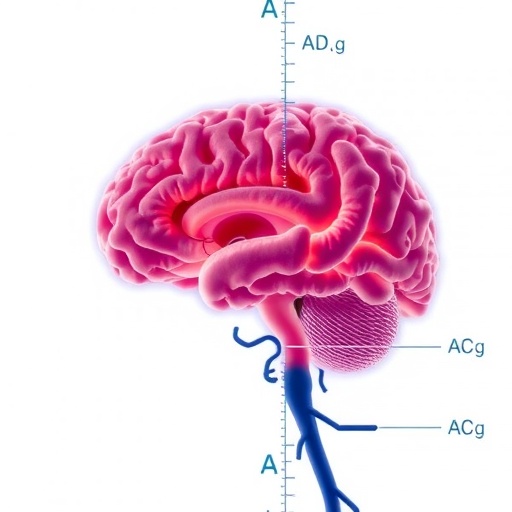In a groundbreaking study published in 2025, researchers explored the profound effects of ferulic acid on a critical biological pathway that plays a significant role in neurodevelopment. The Akt-GSK3β signaling pathway is paramount for various cellular processes, including neuroinflammation and oxidative stress response mechanisms. The study specifically addressed the potential therapeutic implications of ferulic acid on the fetal brain subjected to uteroplacental insufficiency, a condition that can severely compromise fetal development.
Uteroplacental insufficiency is a phenomenon where the placenta fails to deliver adequate blood and nutrients to the developing fetus. This condition has been linked to a series of neurological impairments and developmental disorders. By investigating the impact of ferulic acid, a natural compound known for its antioxidant properties, scientists hoped to uncover new strategies for mitigating the adverse effects associated with this insufficiency.
One key aspect of neurodevelopmental processes is the regulation of apoptosis, or programmed cell death, which is crucial for normal brain development. The Akt-GSK3β signaling pathway is a critical player in this process, acting as a mediator that can either promote cell survival or induce apoptosis, depending on the cellular context. In scenarios of oxidative stress, the balance of this pathway often tips toward cell death, exacerbating developmental issues.
The research team hypothesized that ferulic acid could serve as a protective agent, enhancing the activity of the Akt pathway while inhibiting GSK3β. This dual action is expected to safeguard neurons from the toxic effects of oxidative stress and prevent neuroinflammation, which could be triggered by insufficient maternal-fetal nutrient transfer. By enhancing cell survival pathways, ferulic acid might stabilize neuronal function and development during critical gestational periods.
In their experimental design, the researchers employed both in vitro and in vivo models that accurately represent the conditions of uteroplacental insufficiency. Through a series of controlled experiments, they demonstrated that ferulic acid treatment led to significant reductions in markers of oxidative stress in fetal brain tissues. These findings align with the compound’s known anti-inflammatory properties and support the notion that dietary or supplemental ferulic acid may be beneficial for pregnant individuals facing placental complications.
The study also delved into the molecular mechanisms by which ferulic acid exerts its protective effects. Utilizing western blot analysis, the researchers observed an upregulation of phosphorylated Akt in treated fetal brain cells, suggesting that ferulic acid may facilitate cellular signaling pathways that counteract oxidative stress. Additionally, the downregulation of GSK3β further indicated a favorable shift towards neuroprotection.
Implications of this research extend beyond merely understanding the biological underpinnings of fetal brain development. If these results can translate into clinical practice, ferulic acid could emerge as a viable nutritional supplement for pregnant individuals, particularly those diagnosed with uteroplacental insufficiency. This could mark a significant shift in how practitioners approach fetal development and maternal health.
Furthermore, the antioxidant properties of ferulic acid underscore a broader narrative regarding the importance of nutrition during pregnancy. The findings advocate for more robust discussions on dietary interventions that could enhance fetal health, particularly in high-risk populations. As healthcare professionals continue to explore non-invasive treatments to combat the ramifications of placental insufficiency, the potential integration of ferulic acid into prenatal care protocols might enhance patient outcomes.
Future research aims to elucidate additional molecular pathways affected by ferulic acid and their relevance in various gestational conditions. Understanding these dynamics could pave the way for more comprehensive treatments targeting neurodevelopmental disorders linked with fetal placental complications. The ongoing studies will also assess optimal dosages and the bioavailability of ferulic acid when administered as a supplement, ensuring that pregnant individuals can safely benefit from its properties.
In conclusion, this innovative research underscores the multifaceted role of ferulic acid in protecting fetal brain health amid adverse conditions. As scientists continue to unveil the complexities of prenatal development, the intersection of nutrition and neurodevelopment remains a critical frontier in maternal-fetal medicine. This study not only enriches our understanding of specific signaling pathways but also embodies a hopeful pursuit toward nutritional strategies that could support both maternal and fetal well-being.
Such advancements emphasize the critical need for ongoing exploration in the fields of biochemistry and reproductive science, as the implications for public health and clinical practices are profound. Transforming the landscape of prenatal care may ultimately begin with a deeper appreciation of the power of natural compounds like ferulic acid in nurturing the next generation.
Subject of Research: The effects of ferulic acid on neurodevelopment during uteroplacental insufficiency.
Article Title: The Effect of Ferulic Acid on the Akt-GSK3β Signaling Pathway, Neuroinflammation, Oxidative Stress, and Cortical Damage in the Fetal Brain with Uteroplacental Insufficiency
Article References: Khodabandeh, H., Edalatmanesh, M.A. & Forouzanfar, M. The Effect of Ferulic Acid on the Akt-GSK3β Signaling Pathway, Neuroinflammation, Oxidative Stress, and Cortical Damage in the Fetal Brain with Uteroplacental Insufficiency. Reprod. Sci. (2025). https://doi.org/10.1007/s43032-025-01993-6
Image Credits: AI Generated
DOI: https://doi.org/10.1007/s43032-025-01993-6
Keywords: Ferulic acid, fetal brain, neuroinflammation, oxidative stress, uteroplacental insufficiency, Akt-GSK3β signaling pathway, neuronal protection, prenatal care.




